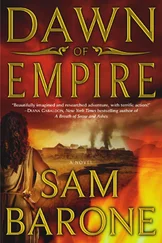Sam Barone - Conflict of Empires
Здесь есть возможность читать онлайн «Sam Barone - Conflict of Empires» весь текст электронной книги совершенно бесплатно (целиком полную версию без сокращений). В некоторых случаях можно слушать аудио, скачать через торрент в формате fb2 и присутствует краткое содержание. Жанр: Исторические приключения, на английском языке. Описание произведения, (предисловие) а так же отзывы посетителей доступны на портале библиотеки ЛибКат.
- Название:Conflict of Empires
- Автор:
- Жанр:
- Год:неизвестен
- ISBN:нет данных
- Рейтинг книги:4 / 5. Голосов: 1
-
Избранное:Добавить в избранное
- Отзывы:
-
Ваша оценка:
- 80
- 1
- 2
- 3
- 4
- 5
Conflict of Empires: краткое содержание, описание и аннотация
Предлагаем к чтению аннотацию, описание, краткое содержание или предисловие (зависит от того, что написал сам автор книги «Conflict of Empires»). Если вы не нашли необходимую информацию о книге — напишите в комментариях, мы постараемся отыскать её.
Conflict of Empires — читать онлайн бесплатно полную книгу (весь текст) целиком
Ниже представлен текст книги, разбитый по страницам. Система сохранения места последней прочитанной страницы, позволяет с удобством читать онлайн бесплатно книгу «Conflict of Empires», без необходимости каждый раз заново искать на чём Вы остановились. Поставьте закладку, и сможете в любой момент перейти на страницу, на которой закончили чтение.
Интервал:
Закладка:
Sam Barone
Conflict of Empires
1
3154 BCE — the city of Sumer on the great southern sea…
Yavtar guided the sturdy ship through the swirling water of the Tigris, toward the Sumerian dock, now less than two hundred paces away, that marked the end of the voyage. On shore a crowd of idlers followed his approach, ready to note the smallest mishap. A portly man attended by two guards pushed his way to the forefront. As Yavtar edged the Southern Star ever closer, he observed the yellow sash tied across the man’s bulging stomach that marked him as one of the king’s representatives, most likely the dockmaster. Arms folded, the man reached the head of the last empty dock and stood there, awaiting the ship’s arrival.
For this important mission Yavtar had traveled day and night, racing downriver from Akkad to Sumer in less than four days. Now he almost regretted the haste, as he had to bring the Star ashore at midday, the peak of dockside activity. Since he hadn’t made a single stop along the way, this would be his first landfall in almost four months. A sailing master who spent more time on land than water soon lost his skills, so Yavtar swallowed his pride and muttered a prayer to the river gods to help him achieve a safe landing.
The Southern Star ’s extra length — she stretched almost twenty-five paces from stem to stern — made her unwieldy in cross-currents. If he misjudged the current when he turned the Star toward land, the swiftness of the water could drive him downstream, stern first, accompanied by laughter and catcalls from shore. Having to come about and pull upwards against the river’s flow would be a humiliating and slow arrival.
Yavtar gauged the moment, then leaned hard on the steering oar, forcing it against the current and almost broadside to the flowing water.
“Drop the sail!” he barked.
A crewman stretched out his arm and jerked hard against the restraining rope. The square linen sail slid down with a thud.
“Pull, you dogs, pull!”
The four crewmen grunted against the sweeps, their bare feet straining for purchase. As the Star edged closer to the shore, the force of the river churned against the length of the hull. The vessel canted over as the pressure increased, and through his feet Yavtar felt the ship pitch up and down against the conflicting forces of water and oars. He caught a glimpse of his five passengers, huddled around the ship’s single mast, and clutching at it for support, their eyes wide with excitement.
The Southern Star began to swing around, and now the bow was less than fifty paces from the dock. For a moment Yavtar thought he’d waited too long. His hand twitched with tension, gripping the steering oar with all his strength, as the Tigris’s powerful current sought to roll the ship over and send the crew and their valuable cargo tumbling beneath the water. He forced himself to wait one more moment, then planted his feet firmly and pulled the steering oar in the opposite direction.
“In oars!”
Spray splashed over the Star ’s bow, and Yavtar feared she might roll over. An instant later, the river relented. As smooth as a leaf floating on the current, the ship glided alongside the dock, and slid gently into its berth with the slightest bump against the rope-wrapped stanchions. Yavtar allowed himself a brief smile. Despite more than two months since his last voyage, his eye still hadn’t lost the skill acquired in nearly thirty years on the river.
Two crewmen leapt onto the dock to secure the vessel fore and aft. The moment the Star stopped moving, the early summer heat struck down from the cloudless, blue sky like a hammer.
“Well done, shipmaster,” Daro said, joining Yavtar at the stern. “I thought we were going for a swim. At least you didn’t give those hooligans anything to hoot about.”
Daro and his four soldiers were the passengers the Star carried, though that term didn’t explain their presence. They were there to protect the ship’s very secret and valuable cargo.
“Not bad for a farmer,” Yavtar agreed with a laugh. Not that anyone thought of him as a farmer, especially now that he owned the largest number of ships in Akkad. His vessels carried cargoes on both the Tigris and Euphrates.
As Yavtar approached his fortieth season, he traveled less and less on the great Tigris, the river that, only a few years ago, had carried him into battle with Lord Eskkar and brought him so much wealth. Now he preferred to spend more of his days on the large farmstead south of Akkad, purchased with his victor’s profits and surrounded by his two wives and a growing brood of energetic children.
Nevertheless, Yavtar still felt the urge to experience water flowing beneath his feet, so he often accompanied more valuable cargoes, if for no other reason than to keep a watchful eye on his hired shipmasters. This trip, despite the worth of its goods, had other, more urgent reasons for bringing Yavtar downriver.
“Is this vessel from Akkad?”
The dockmaster’s abrupt words brought Yavtar back to the present, and he lifted his eyes to the wharf. The officious man with the yellow sash had advanced onto the dock, his bored guards still in attendance, and now stood frowning down into the boat. Looking up, Yavtar perceived the man’s stomach in all its glory, bulging against his tunic from too much food and too little labor. “I’m Yavtar, owner of this boat and — ”
“Do you come from Akkad?” The way the dockmaster uttered the name of the city turned a simple question into an insult.
“Yes, by the order of King Eskkar. We carry — ”
“The only king I know is King Eridu of Sumeria,” the man said, not bothering to hide the disrespect. “You will discharge your cargo as soon as possible. Only you and your sailing master will be permitted to leave the dock or enter the city. If any of your crew steps onto shore,” he jerked his head toward the riverbank, “they’ll end up as slaves.”
The border disputes between Akkad and Sumer had intensified over the last few months, and now affected routine trade. Yavtar glanced toward the city walls and saw a handful of soldiers standing just outside the gate. He counted ten men and their commander.
“And before any cargo is landed, King Eridu has decreed a fee of three silver coins to be paid.”
Yavtar frowned at the outrageous price. On his last trip to Sumer, little more than a year ago, the dockmaster had charged only a single silver, and that was more of a personal bribe than anything official. “And what do I receive in return for this large sum?”
“You are permitted to use the dock until dusk tomorrow. By then, you must be on your way, or you will be charged another three silvers,” the man said, smiling broadly at Yavtar’s discomfort. “If you can’t afford to pay, take your ship and your goods back to your barbarian king.”
Behind Yavtar, the crew and the Akkadian soldiers who guarded the cargo began to mutter at the slur. The last thing he wanted was trouble.
“Then it is my pleasure to make payment,” Yavtar said. He climbed onto the wharf, reached into his pouch, and withdrew four silver coins. “And perhaps you could dispatch a messenger to fetch Merchant Gemama. Meanwhile, I would be most grateful if you could order your work crew to carry the cargo off the dock. I’m certain Merchant Gemama is waiting most anxiously for his goods.” Yavtar dropped the silver coins in the dockmaster’s open palm. The extra one would find its way into the man’s private pouch. “And since I am my own sailing master, I will need one of my guards to accompany me in Sumer.”
After a quick scrutiny to verify their quality, the coins disappeared. “Very well, one servant may accompany you into Sumer. I’ll send a slave to Gemama.” The dockmaster turned away and negotiated his way through the crowd until he reached the awning and chair that awaited him on the riverbank. As the man settled into his seat, he gave orders to the overseer of the work gang. At the slavemaster’s command, they shuffled wearily toward the Akkadian craft.
Читать дальшеИнтервал:
Закладка:
Похожие книги на «Conflict of Empires»
Представляем Вашему вниманию похожие книги на «Conflict of Empires» списком для выбора. Мы отобрали схожую по названию и смыслу литературу в надежде предоставить читателям больше вариантов отыскать новые, интересные, ещё непрочитанные произведения.
Обсуждение, отзывы о книге «Conflict of Empires» и просто собственные мнения читателей. Оставьте ваши комментарии, напишите, что Вы думаете о произведении, его смысле или главных героях. Укажите что конкретно понравилось, а что нет, и почему Вы так считаете.












